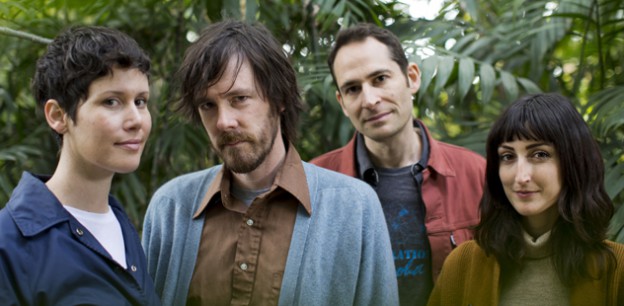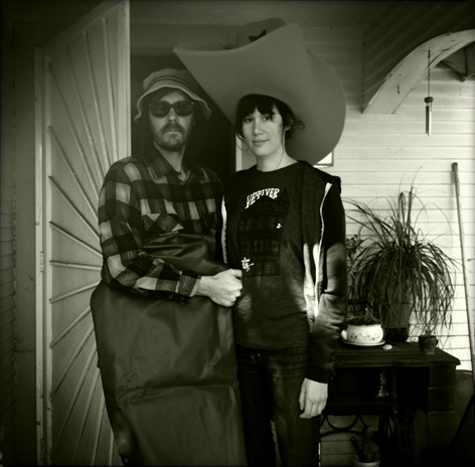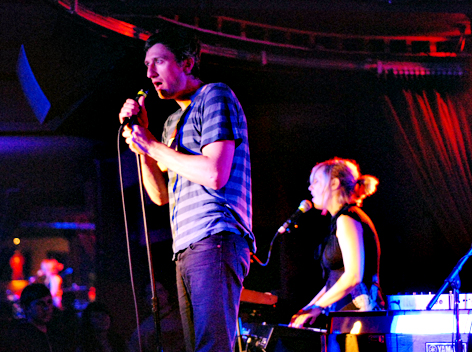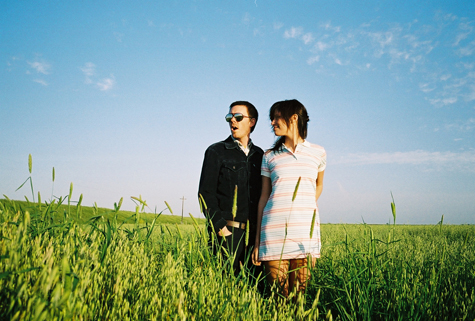The Song Babies
As a major portion of the greater Sacramento-area music fabric, Two Sheds made a splash with the husband-and-wife duo of Caitlin and Johnny Gutenberger (formerly of Far) crossing streams to generate a truly endearing kind of folky pop. The genesis of that obvious chemistry materialized on the band’s impressive debut LP, Strange Ammunition, released in 2006. Following a subsequent EP release and a period of relative stagnancy, the Gutenbergers packed it up and moved to Los Angeles, Caitlin unsure if her next step was grad school or working further toward her artistic goals with the band.
Lethargy ensued even while new muses were slowly unfurling their bemused little tentacles out toward Caitlin as the viscera of her new surroundings began to take hold. And as it is with all artists, something struck. It wasn’t without assistance, though. Chameleonic Portland musician Nick Jaina, a friend of Caitlin’s, issued a challenge to attempt to write 20 songs in one day. After two attempts at reaching this lofty goal, Caitlin had penned somewhere in the neighborhood of 20 songs for Two Sheds, a feat that far surpassed the piecemeal writing-recording regimen she and Johnny had undertaken in the previous three years.
The result is Assembling, an adventurous collection of stream-of-consciousness arrangements, lyrics and recording techniques. It’s also a dream-like jaunt through hazy poppy fields at the precipice of where slumber and fluid improvisation collide. It’s also just an incredibly good album that hubris would do well to side-step.
Caitlin took some time out to wax with Submerge about the new album, how she’s tired of acting like George Lucas all the time, and the immaculate conceptions of song-babies from the thunderbolts of the ether. It’ll make sense later… Read on!
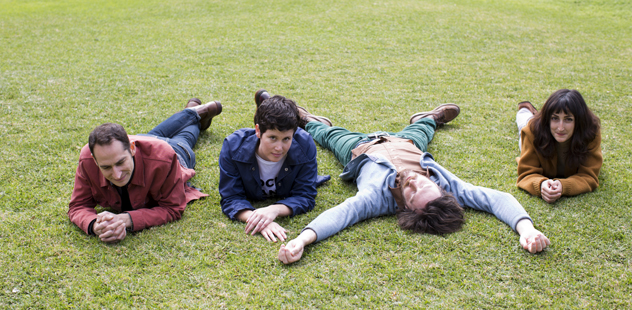
Tell me about how these songs came together. I understand there were dares involved.
Yeah, basically before I wrote the record, I wasn’t really writing much. We’ve always recorded things really piecemeal. It’s been more of a long and drawn-out process, which can produce great results, but I just wasn’t being terribly productive in the songwriting department. So my really good friend from Portland, Nick Jaina, he’d been doing this exercise that he’d been trying to get me to do for a while. It was this songwriting challenge where you try and write 20 songs in a day. Which is ridiculous on its face, but I think the point of it is that you don’t have any time to get precious about what you’re doing or to think about whether or not something is good or bad. It’s just to get through it, which was a really good experience for me. I just did it to see if I could do it. The first time I did it, I wrote 11 or 12 songs, and I was like “Holy shit!” The whole day it was kind of painful and arduous, but at the end of the day I looked back to what I did, and there was some cool stuff in there. So I did it again a month or so later, and I wrote six songs in a day. So I had almost 20 songs, and then around that time we had some friends who own a studio down here [in L.A.] called New Monkey and they had four free days, and said, “Why don’t you come down and see how much stuff you can get done in four days?” We recorded 14 of those almost 20 songs in four days. That was literally the record. I think it’s one of those things that was just good to do. It’s just sometimes good to do things that are seemingly hard or silly to see if you can do it, and I think the cool thing that came out of it was me realizing that if I just go and sit in a room long enough and muscle past the judgment or the gag reflex of initial songwriting ideas, something is going to happen. It was a great experiment for that reason.
As you were going through it, and then the month or so in between those sessions, what strengths or weaknesses did you find you were facing by approaching it that way?
Well the weaknesses are that you don’t really allow yourself the time to fine-tune things. It’s really just about allowing the feelings or the thoughts that you’re having in the moment to come out and sometimes while it’s happening, none of it seems to make any literal sense or you don’t even know what you’re writing about. Then you go back and revisit it when you’re away from that intense day, and you’re like, “Oh my gosh! That song is totally about that one argument I had with my friend!” It’s weird; I had time to think about it in a more analytical way after it was done.
I think the strengths of it for me were just having the realization that if I go in and I work on something and I just allow myself to continue working through something even if I feel like it’s not working out, something can come out of it. Before, I always thought of songwriting as that beam of light that comes down when the clouds part and flashes you in the middle of your forehead and you’re like, “Yes! This is my song-baby that just came to me!” I realized that, actually, having something happen is just something that happens in the middle of you trying to do something. You don’t have to wait for it. It’s great when it is the beam of light, but you can actually also make great stuff if you just kind of look at it more like getting a job done.
I tend to find the more you go back and try to fix something, the less satisfied you are with it. You’re trying to recapture the moment you had when you came up with that idea and it’s not the same. I feel like I tend to George Lucas-ize things more than I tend to Leonard Cohen them, ya know? “Oh what we need in this part of the song is more pod races and more conversations about trade federations!” Then you look back at it later, and you’re like “What the hell was wrong with the demo, man?”
It seemed to me on a song like “You Get to Me” that you weren’t shy about trying different rhythms, and later on the recording, different noises and textures. Can you speak to that experimentation as it relates to the musicians who recorded on the album outside of yourself?
Yeah, well with a song like “You Get to Me,” I wrote this song and it was just this little picky guitar part, which is still on the recording. In general, I’ve always felt like everyone in my band has a really distinct kind of musical perspective. One of my favorite things is writing a song and giving it to my band and seeing how everyone responds to it. We just drew up the demo in the studio, and Johnny was like, “Oh my gosh, it would be funny and awesome to put this Casio beat under it.” We did it and started using it as a click track, but then we definitely started to get attached to it. Our friend was playing piano and we ran it through a Space Echo, because wouldn’t that be fun? It was so stream of consciousness and so not intentional. It was like literally us looking at things in the studio going, “Huh, that’d be fun to use.” It was whoever had the coolest idea at the time while we were just flowing with stuff just tried it. It all just came together. It was really, really fun for that reason.
See Two Sheds live as part of the Davis Music Festival on June 20, 2015, at Odd Fellows (415 2nd Street, Davis). Weekend passes are available for the three-day music fest (now in its fifth year) for just $25. To purchase tickets, go to Davismusicfest.com, where you can also find full line-up information.
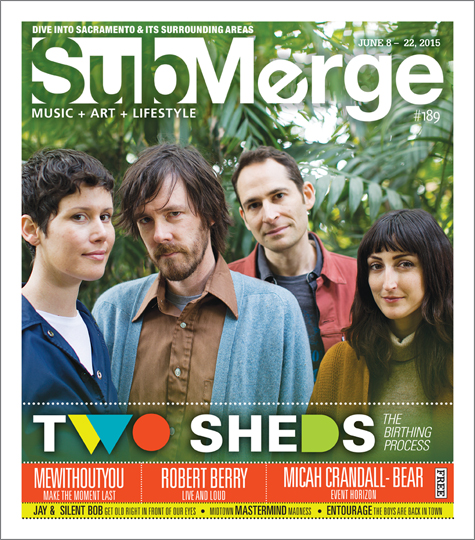
Longtime Sacramento indie/folk-rock darlings Two Sheds will soon be Los Angeleans (boo, hiss). After much time spent in the City of Trees, 30-plus years for bassist/backing vocalist Johnny Gutenberger and 18 for singer/guitarist Caitlin Gutenberger, they are ready for something new. Submerge reached out to Two Sheds and took a line out of one of our favorite songs of theirs, “WTF?” and asked, “What the fuck?”
“We’ve been talking about moving for a long time,” Johnny said. “Not because we hate Sacramento or are ‘down on the scene,’ we just wanted a change.”
It’s understandable, really. It’s a natural thing for human beings, especially creative ones, to crave change after so long in one place. Sometimes new scenery can stimulate the senses.
“We just want to try a new town on for size and see if we can get some fresh inspiration out of it,” Caitlin said. “And we’re purposely moving to a place that won’t be comfortable. We want to be out, motivated and restless for a while.”
“What better place than Los Angeles?” said Johnny.
Their final local gig for quite some time is set for Saturday, May 19, 2012 at Luigi’s Fungarden in Midtown. Johnny and Caitlin will be joined on stage by drummer Rusty Miller, guitarist Chris Larsen and a special guest for this show, Kris Anaya of Doom Bird on keyboard.
“We’re gonna try and fill out our sound a bit,” said Johnny. “We always have these little parts on recordings that don’t get played. Kris is gonna do all that with the keys.”
Two Sheds will have a bunch of cool stuff available at the show, like an EP with five cover tunes (The Troggs, Guided By Voices, The Bobby Fuller Four and more) and special hand-screened posters by Asbestos Press. Purchase a poster, get a download of the EP, purchase a cassette tape, you get a download of the EP, and according to their website (http://ilovetwosheds.com/), “Buy Johnny a beer, you get a friend for life.” Joining them on May 19 will be San Francisco’s Birds and Batteries (whom Two Sheds also covers on the EP), and Dana Gumbiner (of Deathray). Show is all ages, $7 at the door, 8 p.m.
Sacramento’s Far Comes Home
By Mark Lore | Photos by Jeff Gros
They say you always want to go out on top. If that’s the case, then Sacramento’s Far did everything right. In the mid-’90s Sacramento was on the radar as bands like Cake and Deftones were signing to majors (remember those days?), while post-hardcore was bubbling underneath the city’s surface.
Far soon followed. After a pair of indie releases (1992’s Listening Game and Quick in ’94), the band signed with Epic/Immortal and released Tin Cans With Strings to You in 1996, in the process amassing a dedicated following. Hell, you know the story. Far released its best record in 1998—Water & Solutions—an album that harnessed punk, post-hardcore and even pop (?!) into 41 flawless minutes”¦then called it quits.
“I’m happy we stopped after Water”¦,” says vocalist/guitarist Jonah Matranga. “It was a good balance of all of our personalities.”
Those personalities have fueled various projects over the years—Matranga with his own project, Onelinedrawing, and bands like New End Original and Gratitude. Guitarist Shaun Lopez fronted The Revolution Smile. Drummer Chris Robyn and bassist John Gutenberger went on to form the more pop-oriented Milwaukee, while Gutenberger later formed Two Sheds with his wife, Caitlin.
But it always comes back to Water & Solutions—an album that a decade’s-worth of bands would nefariously hold close to their pained little hearts. In fact, Far might be one of the few bands that actually gained popularity after it broke up.
While it was surprising to hear that in November Far, after a decade apart, was planning on playing a few shows in the U.K., it’s been no surprise that the band’s recent reformation has been met with such unadulterated glee. But the members of Far have kept it loose and stress-free—they re-emerged under the moniker Hot Little Pony, recorded a cover of Ginuwine’s 1996 hit “Pony” (yes, Ginuwine), and are now gearing up for their homecoming show at the Empire on Jan. 15.
Submerge caught up with Matranga and Lopez, who filled us in on the not-so-elaborate Hot Little Pony marketing scheme, what the future holds, and why they don’t want to be blamed for Fall Out Boy.
The music climate has changed quite a bit in the last 10 years. Is that a good thing or a bad thing?
Shaun Lopez: It’s good for us, because we’re in a unique position in being able to go out on tour and be self-sufficient, and be able to make a little money on top of that. I feel for new bands starting up right now because it is tough out there. Record deals being offered to young new bands are not so great; they’re almost better off doing it on their own. For us it’s been OK. Luckily we’re in a position that we do have fans that are pretty dedicated—it’s something we’re very thankful for and very surprised.
Whose idea was it to start playing together again?
SL: It came close when we did the re-release of Water & Solutions [in 2004]. It never came to, and I think in all honesty it probably wasn’t the right time and it wasn’t for the right reasons. Chris [Robyn] and I had been talking about it off and on and then Jonah called me about a year ago and brought the idea of just showing up at a club and playing. I liked the idea of playing again, but I wanted to do it more professionally and go out on a tour.
Jonah Matranga: He always tries to be more professional than me; I’m always the guy that wants to go out and just bang it out. And he’s like, “No dude, gotta rehearse; make it good.” So we balance each other out that way.
There was this semi-elaborate scheme with the Hot Little Pony concept. Whose idea was that? And who decided to record a Ginuwine song?
JM: What looks complex from the outside is just us fucking around on the inside. We wanted to play a couple of shows, and I just really wanted to take the hype away from it because a) I don’t like it, and b) I wanted us to be as unstressed as possible. I think our friend Jeff jokingly thought of the name Hot Little Pony. And we just all laughed when he said it and thought, “Ah that would be really fucking funny.” “Pony” is a tune that we’d always play before shows back in the day. And it’s just a simple song, and so Shaun and Chris laid it down [in Los Angeles] and I came down and sang it. Shaun added his magic dust to it. I don’t know, it just came out; it was a fun, very quick thing.
Now you have your homecoming show in Sacramento. Is that going to be a gauge of whether this continues?
JM: I think it’s all a gauge. There’s nothing official on the books, but there’s a lot being talked about. I think we’re all just trying to take it as it comes. The first two Hot Little Pony shows were like, “OK, can we do this well?” Because it was really important to all of us to not go up there and suck. And then we did the L.A. shows and thought we pretty much ripped it. Then we thought, “OK, can we tour together? Can we not drive each other insane?” The whole “Pony” thing has definitely thrown it into a different gear. We’ve never had any sort of radio play like this so we’ll sort of look at that and see what that means, if anything.
Any shows beyond Sacramento?
JM: Just Sacto. We’re very excited about that. It’s a big enough show where I think it will be fun and exciting, but it still feels like home. We got some friends’ bands on there. I feel pretty sure that more shows will happen, but we have nothing on the books. And then we’re looking at trying to do a little recording together, see what happens with that. My particular take is just trying to do a couple of covers that suggest where we came from as a band. I’m very reticent to do original songs. I don’t want to do an original song just to have a new song, and have it not be as good as the old shit. Because all of our favorite old bands do that and it blows.
Water & Solutions has been touted as your masterpiece. Does that put more pressure on you to record?
SL: I realize that no matter what we do, people are always going to love that record. That’s going to be the record.
JM: Yeah, but some people, frankly, like Tin Cans“¦ more, which I don’t understand. That’s the thing with putting out records”¦I don’t get to control what other people think. But for me, there’s no pressure with people, there’s just pressure for me… I just want to know it kicks ass. We could put something out as good as Nevermind, and people will still be like, “Yeah, you know, I kinda like ‘Bury White.'” But I would just want to feel in myself that it came from an inspired place, and that I could go out with confidence and play it live and feel as strong as I do playing “Bury White” or “Mother Mary” or “Man Overboard.” Those songs, I just feel good playing them. And I don’t feel good playing them because I’m used to them; I feel good because they’re good, and they’re good 10 years later.
Far has influenced a style of music that is looked down on, although you sound nothing like those bands. Do you guys think about that?
JM: I’ve been asked that question a gazillion times in interviews, and my stock answer that sort of makes me laugh, that I totally believe is: I don’t blame Led Zeppelin for Whitesnake and I don’t want to be blamed for Fall Out Boy. We just came around trying to play rock ‘n’ roll that was less dressed up and more human, and mixing heavy shit and more anthemic shit we liked from big rock with this sort of humble, straight in-your-face element of punk. A lot of bands at the time were doing that. And as it happened, when that sort of caught on, there were a lot of bands that traded in their leopard jeans and whatever else the fuck for horn rims and tight pants. They took all the cheap parts and tried to make money off of it, and forgot the important part, which was the humanness of it.
You’ve all changed as people in the last 10 years. How is Far different today than it was in ’98?
JM: The funny thing is that we’ve all changed as people, but the personality balance still to me is working out relatively similarly. I think Shaun and I are better at recognizing that we’re different people, and talking it through, which rules.
SL: Yeah, the communication is much better. In the past a lot of the problem was that when shit would piss people off, they wouldn’t say anything.
JM: It feels good now to come in with a little more time to breathe. And I do think we’ve all, through our individual experiences, learned a little about how important it is to clear the air before shit gets crazy.
Being in a band is like being in a relationship “¦
JM: I liken it to a relationship where the sex is really good, but everything else is weird [laughs]. To me that’s the closest analogy I could come up with without sounding creepy.

Harlow’s Sacramento
Monday, Oct. 6, 2008
Upon entering the dimly lit Harlow’s Restaurant and Night Club last Monday, I was delighted to see that Two Sheds had been booked as the last minute opener for Mates of State. I immediately noticed that it was not only Caitlin and Johnny Gutenberger (who make up Two Sheds) occupying the stage; there was another women sitting in-between the two assisting with vocal harmonies and light percussions, including the tambourine. I later came to find out that it was none other than Amber Padgett of the local duo Spider Silk Dress. Her addition was a great one and Two Sheds entire set was fantastic, but it seemed like the majority of the crowd didn’t care because almost everyone was talking—so loud in fact that it was nearly impossible for me to really focus on the music. Maybe I chose a bad spot to stand (I do that sometimes), maybe they weren’t there for the opening band, but come on people, show the band some respect and shut the fuck up for a few minutes. My guess is that the lack of bass and drums during Two Shed’s set made it easy for the audience’s short attention spans to become even shorter. What a shame.
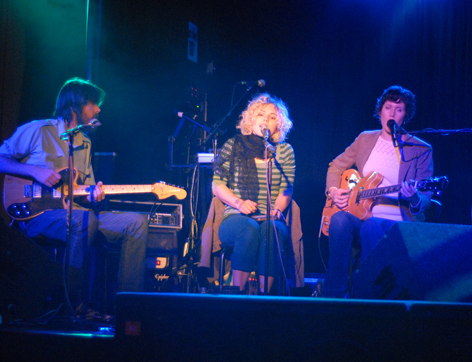
As soon as Mates of State took the stage my theory was proven correct: all it takes is loud drums to get people to shut their yappers (probably because they can’t hear each other talking) and actually focus on the music. As if they were trained to do so, the entire crowd stood up and rushed toward the stage to get a closer look at Kori Gardner (keyboard/vocals) and Jason Hammel (drums/vocals). The two are married and have been making records and touring together since 1997, so they are solid as can be. The chemistry between the two on stage was something I have never before witnessed; you could sense them communicating while playing. They would cue each other with tiny glances or facial expressions to change parts or bring a song to an end.

Their timing and harmonies were flawless, further proving another theory of mine that every married couple should just make music together instead of making babies. When the two would simultaneously sing complementary vocal melodies it was so layered and sounded so huge that it was hard to believe only two people were on stage. At a couple different points during their set, two other musicians joined them: one played cello, adding a very symphonic, cinematic feel and the other played electric guitar (which wasn’t even really noticeable in the mix) and messed around on a laptop playing loops and samples here and there.
Crowd favorites of the night seemed to me to be “Fraud in the ’80s,” and “Like U Crazy,” both off their ’06 release Bring It Back, and “The Re-Arranger” which is on their newest album Re-Arrange Us and on this particular night brought their set to an end (before the obligatory encore of course).
As the show came to an end we quickly guzzled what remained of our beers and stumbled out the door, satisfied with the performances of both artists.
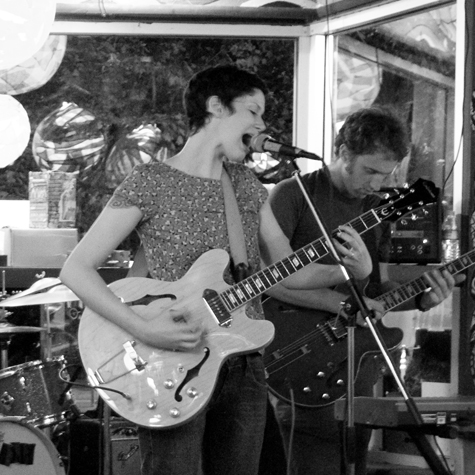 Two Sheds
Two Sheds
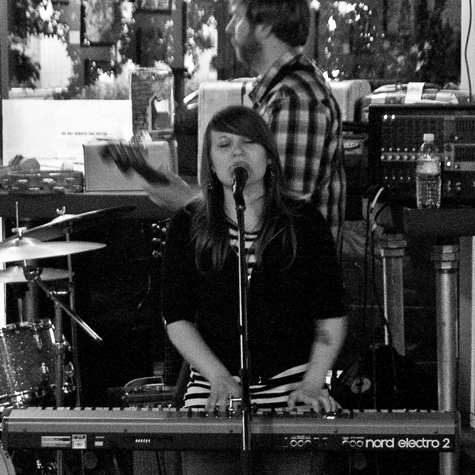 Friday Mile
Friday Mile
Two Sheds, Friday Mile, James Finch Jr.
Java Lounge, Sacramento
June 13, 2008
Coffee shops have always been some of my favorite places to enjoy a few quiet moments with a book and some headphones, or to catch up with an old friend, or even to catch up with myself every now and again. However, they’re not always the greatest of places for a band’s musical performance; seldom have I seen a band pull off their sound in such an environment. Fortunately, this Friday night would be an exception due to the fact that I was seeing Two Sheds perform in their own neighborhood coffee shop, Java Lounge, in downtown Sacramento, along with Friday Mile (Seattle), and James Finch Jr. (San Francisco).
To begin, James Finch Jr. took to the tiny stage with an acoustic in hand and a friend by his side to play a couple licks here and there. James’ sound was a familiar one: an indie folk and blues acoustic sound. A reverberate hollow body electric guitar added a fantastic layer to his songs. Near the end of his performance, the songs began to get somewhat monotonous and obvious, but his set was very fitting for the coffee shop vibe and was overall pleasing to the ears.
After grabbing a cup of coffee, Friday Mile, who had just begun their west coast tour with Two Sheds, surprised me with their catchy melodies and meticulous instrumentation. The rhythm section, composed of Chad Clibborn on drums, and Jake Rohr on bass, laid a solid foundation for each song, continuously moving them through each section and keeping it all very interesting. Clibborn had a smooth, low dynamic feel, playing more upbeat tempos, while Rohr followed, grooving up and down the fret board. Jace Krause and Hannah Williams combined their vocals to create an awesome atmosphere of harmonies and hooks that caught my ears left and right. Krause’s guitars were nearly as catchy as his vocals and Williams provided a striking ambience on keys, using the classic Rhodes tone, an organ and your standard piano. During the set, Williams informed the crowd that the band was working on an album and that some of the songs they played were still in the works. I look forward to hearing more from this band and highly recommend giving them a listen.
Out of the 30 people sitting on the floors, standing in a semi-circle and crammed on the couch, I’d say about 20 of them were the friends and family of Two Sheds. Everyone was chit-chatting and having a great time the entire evening. I found it awesome that they decided to have an intimate show for their CD release. I’ve been listening to Two Sheds and have been curious about their live show. I can safely say that watching them play is indeed even better than listening to their recordings, which are also great. The band usually has an array of instrumentalists, however, for this performance, they remained a four-piece to cater to the intimate setting, playing a more mellow set. Vocalist and guitarist, Caitlin Gutenberger was spot on, singing with much conviction while tediously working her dreamy guitars. Her voice created the tone for each and every song’s story, painting clear pictures with her unique imagery. James Finch Jr. reappeared on electric guitar and keys this time providing atmospheres with sparse notes and rhythmic movements. Rusty Miller supplied the simple, but fitting beats that assisted songs in their progression, while the bassist known as Johnny followed along, bringing up the low end very tastefully. The band’s chemistry was vibrant and added much to the environment of the tiny room. It was a privilege to see this band in their humble beginnings, although I expect to see them making a huge mark with the release of their new EP, as well as their plans for touring this year.
Words by Jeff LaTour
Photos by Brian Kellogg
Caitlin Gutenberger talks Two Sheds
Since 2006, Sacramento act Two Sheds has garnered much success with their debut album, Strange Ammunition (UnderAcloud Records). The S.F. Weekly has dubbed them “dreamy and captivating,” while other critics have compared them to the likes of Hope Sandoval, Lucinda Williams and Beck. Their folk-rock influenced sound has captured the attention of many. With a new self-titled EP out exclusively on iTunes (Filter Recordings), Two Sheds is back on the road promoting their new material. Submerge had a chance to speak with singer Caitlin Gutenberger during some free time on the tour.
Your new EP was released May 6 on iTunes on Filter Recordings. Describe the recording process with this EP and how it differs from your last record, Strange Ammunition.
It was pretty similar. The only thing that was different was we recorded everything in two days at the Hangar, where before we had four months to do the full record. So, it was definitely something where I felt I was little more under the gun. And there are a few things on there that I recorded at home into Garage Band, so there is that mix of recordings.
I love the cover of the EP. What is the meaning behind the picture?
The cover is actually a picture of my mom. It was a picture that my dad took of her. They were in Mexico and it was 1975. They were on a little trip after they had gotten married and they took a taxicab across Mexico and it broke down right at the Tropic of Cancer. And so, that’s my mom leaning up against the marker for the Tropic of Cancer and the broken down taxicab.
That’s awesome. It’s probably one of the best album covers I have seen.
Well, it was nice to be able to use something that was of my family. On the last record, we put our dog on the cover. We just thought it would be better if we used an image that was personal.
Are there other musicians on the album this time, because I know the times that I have seen you, you guys have had other people come up and play.
Johnny [Gutenberger], Rusty [Miller], James [Finch, Jr.] and myself pretty much make up the core band right now. We have Amber [Padgett] sing background vocals some times.
How has touring been? Seems like you guys are always on the road.
Touring has been great. There’s always the standard tour stuff…flat tires here and there. We’ve played some cool shows. Our last show in L.A., we played with Akron/Family, which was really cool. I think the benefit of touring is getting to meet cool bands and being able to revisit places.
What is your favorite venue to play in Sacramento?
Well, I think for the cozy factor, it would be Old Ironsides. Art is there…he always pours a strong beverage. All of our friends are there…and Larry. Good ol’ Larry.
I know that you guys have a lot of friends who are musicians, but do you have a favorite local act?
That’s tricky. Let me think. I really liked Knock Knock’s record a lot. I’ve always really liked Chelsea Wolfe and her various projects.
You list Elliott Smith as one of your influences on your Web site. What kind of influence has he had on your music?
Well, I’ve always liked music that has an acoustic element to it. I think that has a lot to do with the kind of music my dad played for me when I was younger…like the acoustic Zeppelin stuff and old blues music. So, when I heard Elliott’s music, it kind of struck me in the same way where it felt kind of nostalgic and familiar, but I hadn’t heard it before. It’s really sad and honest and unpretentious.
Any other influences?
I like old soul music. Bill Withers is wonderful. I like Otis Redding, old Stevie Wonder and Ray Charles.
Do you ever get compared to other female musicians because I know that people love to cling to other artists that they are already familiar with.
Yea… Well, the classic ones, being a girl and having a somewhat whispery voice are Hope Sandoval and Cat Power. I get those quite a bit.
How does that make you feel?
Well, I have been very sensitive to it. In most cases, when people say that to me, it’s their way of complimenting our music by saying that I remind them of those artists. It is easy to read too much into it and think that people are comparing because they think that I’m a copycat or unoriginal. You’ve got to try to not read too much into comments like that and understand that as a female artist, you’re going to get comparisons. Most of the time, people are just trying to say that they like your music by comparing. There have actually been times where I have discovered really cool people that I like by being compared to them.
Like who?
Like, Lucinda Williams…I had never heard of her before and I think she is amazing. Someone recommended Bright Black Morning Light and I love their record.
What do you have planned for Two Sheds?
We’re touring through July and possibly August. Filter Magazine‘s label just released our EP on iTunes and the plan is for the EP to be an introduction for those who don’t know us. There are plans to possibly re-release the first record, Strange Ammunition. All things are subject to change, but we’re just going to take it one month at a time.
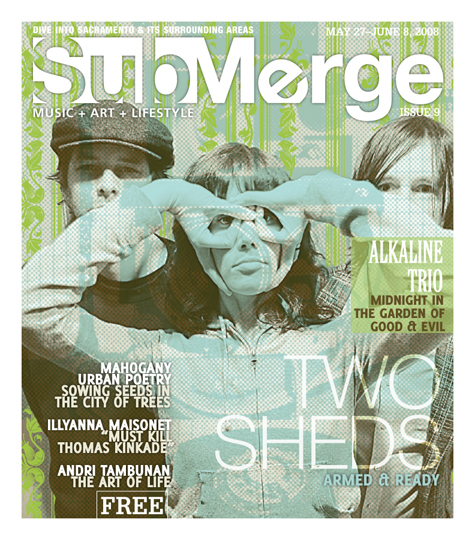
Stay up to date on Two Sheds visit Ilovetwosheds.com



